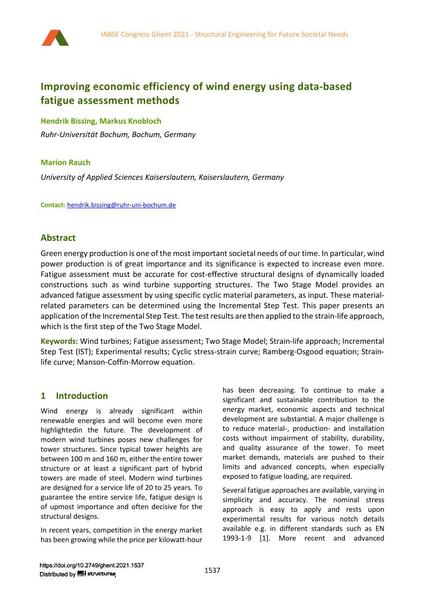Improving economic efficiency of wind energy using data-based fatigue assessment methods

|
|
|||||||||||
Détails bibliographiques
| Auteur(s): |
Hendrik Bissing
(Ruhr-Universität Bochum, Bochum, Germany)
Markus Knobloch (Ruhr-Universität Bochum, Bochum, Germany) Marion Rauch (University of Applied Sciences Kaiserslautern, Kaiserslautern, Germany) |
||||
|---|---|---|---|---|---|
| Médium: | papier de conférence | ||||
| Langue(s): | anglais | ||||
| Conférence: | IABSE Congress: Structural Engineering for Future Societal Needs, Ghent, Belgium, 22-24 September 2021 | ||||
| Publié dans: | IABSE Congress Ghent 2021 | ||||
|
|||||
| Page(s): | 1537-1545 | ||||
| Nombre total de pages (du PDF): | 9 | ||||
| DOI: | 10.2749/ghent.2021.1537 | ||||
| Abstrait: |
Green energy production is one of the most important societal needs of our time. In particular, wind power production is of great importance and its significance is expected to increase even more. Fatigue assessment must be accurate for cost-effective structural designs of dynamically loaded constructions such as wind turbine supporting structures. The Two Stage Model provides an advanced fatigue assessment by using specific cyclic material parameters, as input. These material- related parameters can be determined using the Incremental Step Test. This paper presents an application of the Incremental Step Test. The test results are then applied to the strain-life approach, which is the first step of the Two Stage Model. |
||||
| Mots-clé: |
éoliennes
|
||||
| Copyright: | © 2021 International Association for Bridge and Structural Engineering (IABSE) | ||||
| License: | Cette oeuvre ne peut être utilisée sans la permission de l'auteur ou détenteur des droits. |
||||
